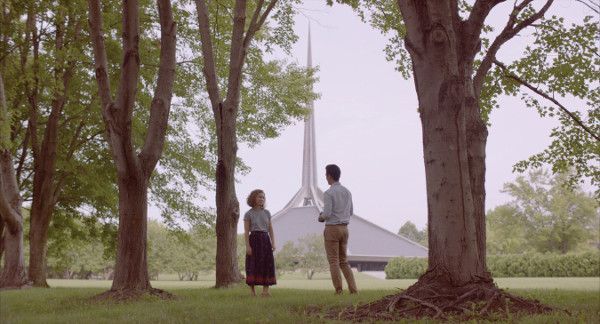Eye For Film >> Movies >> Columbus (2017) Film Review
Columbus
Reviewed by: Amber Wilkinson

Space is the key to the Kogonada's thoughtful debut - in all of its dimensions. Most obviously, there are the spaces that his central character Casey (Haley Lu Richardson) inhabits - the city of Columbus, Indiana, where she has fallen in love with the slightly asymmetrical modernist architecture it is known for; the library stacks where she half-flirts with her colleague Gabriel (Rory Culkin); or the house where she hangs out with her mum (Michelle Forbes) or worries about her when she's at work. Then there's the space inside Casey, the yearning for something different, the fear of what might happen to her mum if she leaves.
Jin (John Cho) finds his space shrinking as he comes to Columbus, as much from Korean cultural tradition as desire, to sit at the bedside of his ageing father after he collapses while visiting the city. One day, he and Casey walk into one another's spaces - it's a chance encounter but like everything in Kogonada's film, it is beautifully balanced - one on one side of a fence, one on the other. Much in Columbus is shared, from soup to cigarettes to emotions.

The writer/director treats the space within the frames of his film with the utmost care and respect, achieving a deliberate, not-quite-symmetry that mirrors the architecture, from back to front, up and down and from right to left. The sense of poise this creates, as people move through spaces or talk back and forth, objects often leaving the frame in one direction as another enters from the opposite side, achieves a soothing rhythm. Measured dialogue takes on additional weight and intensity because of the way the scene is shot, such as one conversation where one character is glimpsed in a rear-view mirror. This deliberate pacing, supported by Hammock's ambient scoring, allows us the time to feel the ways in which the characters' emotions also complement one another.
"Did your mother do meth?" the rhythm of the words appeals to Casey and equally to Kogonada, who also manages to achieve a balance in the dialogue without lapsing into platitudes. "This isn't the movies. Nothing's going to happen," says one character. In a way that's true. This isn't a film specifically about romance or grief, it's about reflection, connection, learning to shift your perspective and realising what is possible. Even the themes of the film are balanced, such as the pull of the past and the attraction of the future. Kogonada may be a skilled craftsman, but he never forgets his direction is serving the story and the characters, rather than the other way around.
Cho and Richardson slot together like perfectly, she playing Casey as bright-eyed with an easy smile and who deserves to succeed, even if her working-class background threatens limitations, while he brings a more world-weary but thoughtful calibration to Jin. Both actors deserve considerably more attention from casting directors.
In the end, the film is like an unexpected shell you might find on the beach, it might not look like too much at first but, once you start to turn it over in your hand and mind, you start to feel its weight and notice its facets, making you want to put it in your pocket and take it home so you can look at it again.
Reviewed on: 08 Oct 2017















